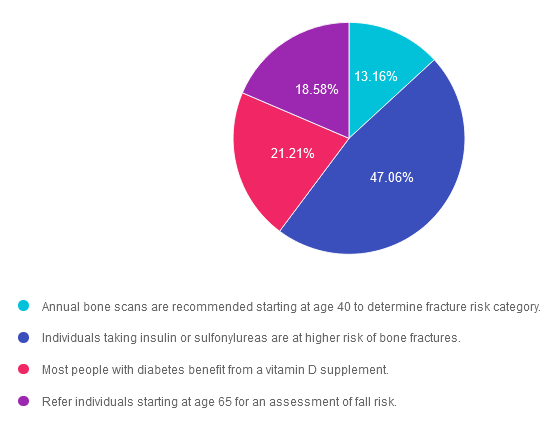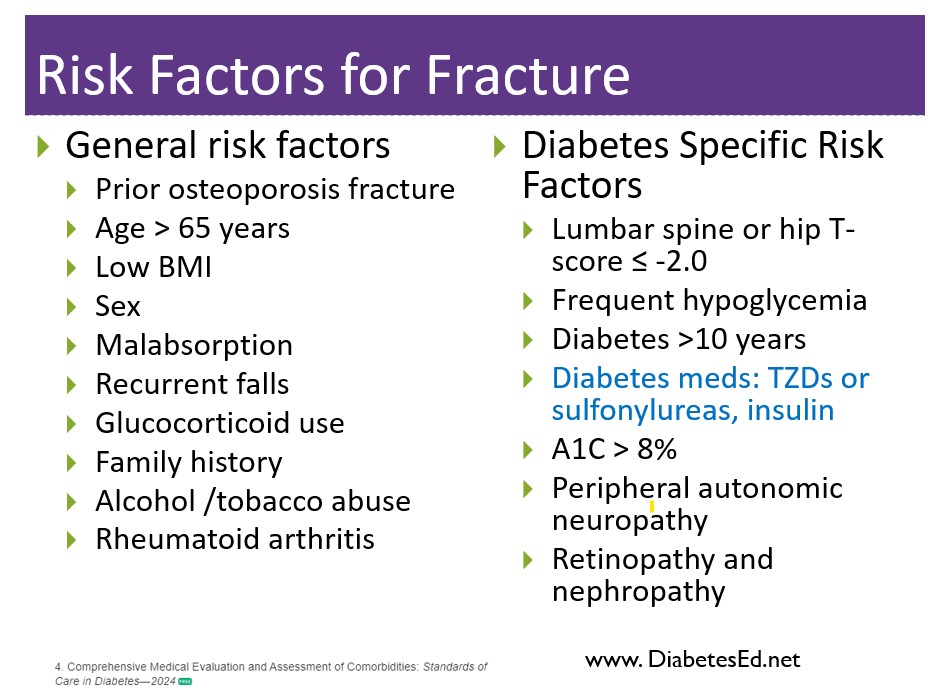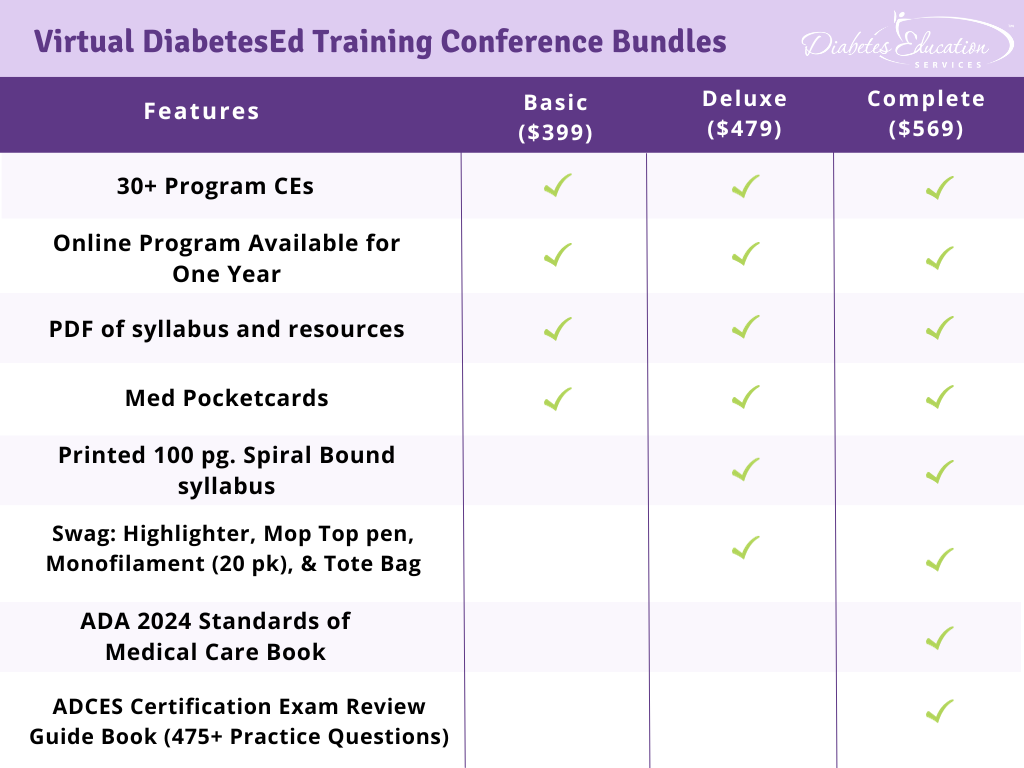
For last week’s practice question, we quizzed participants on bone fracture prevention based on ADA Standards. 47% of respondents chose the best answer. We want to clarify and share this important information, so you can pass it on to people living with diabetes and your colleagues, plus prepare for exam success!
Before we start though, if you don’t want any spoilers and haven’t tried the question yet, you can answer it below: Answer Question
Question: Since people with diabetes are at increased risk of fractures, the 2024 Standards have an increased focus on preventing bone fractures.
Which of the following is an accurate statement regarding diabetes and bone fractures?
Answer Choices:
- Annual bone scans are recommended starting at age 40 to determine fracture risk category.
- Individuals taking insulin or sulfonylureas are at higher risk of bone fractures.
- Most people with diabetes benefit from a vitamin D supplement.
- Refer individuals starting at age 65 for an assessment of fall risk.

Getting to the Best Answer
If you are thinking about taking the certification exam, this practice test question will set you up for success. Test writers anticipate possible answers based on the details in the question. They will wave those “juicy answers” right under your nose. Your job is to weed through the particulars, pluck out the most important elements and choose the BEST answer.
Answer 1 is incorrect. 13.16% chose this answer. “Annual bone scans are recommended starting at age 40 to determine fracture risk category.” This answer is tempting, but it doesn’t match the ADA Standards that recommend to, “Monitor bone mineral density using dual-energy X-ray absorptiometry of high-risk older adults with diabetes starting at age 65 and younger individuals with diabetes and multiple risk factors every 2–3 years.”

Answer 2 is correct. 47.06% of you chose this answer. “Individuals taking insulin or sulfonylureas are at higher risk of bone fractures.” Yes, this is the best answer. People taking medications that can cause hypoglycemia are at higher risk of falls. Clinicians need to consider the potential adverse impact on bone health when selecting pharmacological options to lower glucose levels in people with diabetes. Prioritizing medications with a proven safety profile for bones is recommended, particularly for those at elevated risk for fractures.
Answer 3 is incorrect. About 21.21% of respondents chose this. “Most people with diabetes benefit from a vitamin D supplement.” This answer is also tempting, but the ADA Standards of Care does not recommend vitamin therapy for “most people”. Vitamin therapy is based on an individual assessment of potential benefit.
Finally, Answer 4 is incorrect. 18.58% chose this answer. “Refer individuals starting at age 65 for an assessment of fall risk.” This answer is tempting, but the ADA recommends we individualize our approach and consider risk of falls and fractures on a ongoing basis. “Fracture risk should be assessed in older adults with diabetes as a part of routine care in diabetes clinical practice, according to risk factors and comorbidities”
We hope you appreciate this week’s rationale! Thank you so much for taking the time to answer our Question of the Week and participate in this fun learning activity!
Learn more about Bone Fracture Prevention and ADA Standards
Virtual DiabetesEd Training Conference – Join us Live on April 17th – 19th 2024 at 11:30 AM PST

Join Coach Beverly and Team for two and a half days of knowledge-sharing, fun, and “aha” moments for our Virtual DiabetesEd Training Conference April 17th – 19th, 2024.
Attendees will leave this conference with new tools and a refreshed understanding of the latest advances in person-centered diabetes care. Our team highlights the ADA Standards of Care, medications, behavior change, technology, medical nutrition therapy, and more!
Our instructors co-teach the content to keep things fresh and lively.
Friend Discount: 3 or more only $449 per person. Email us at [email protected] with the name and email of each registrant to get the discount!
Program Details
- Dates: April 17-19th, 2024
- Registration Fee: $399-$569 (see more about reg. options below)
- Friend Discount: For 3 or more people, each person saves $50 off their registration. Email us at [email protected] with the name and email of each registrant to get the discount!
- CEs: 30+ CEs | 18 units for Virtual Conference plus 10+ Bonus CEs. CEs can be applied toward CDCES’s initial application or renewal.
- Speakers: View Conference Faculty
Registration Options

Sign up for Diabetes Blog Bytes – we post one daily Blog Byte from Monday to Friday. And of course, Tuesday is our Question of the Week. It’s Informative and FREE! Sign up below!
Accreditation: Diabetes Education Services is an approved provider by the California Board of Registered Nursing, Provider 12640, and our CPEU courses have received Prior Approval* from the Commission of Dietetic Registration (CDR), Provider DI002. Since our CPEU courses received Prior approval* from the CDR, these CPEU courses satisfy the CE requirements for the CDCES /BC-ADM regardless of your profession!
The use of DES products does not guarantee the successful passage of the certification exam. CBDCE and ADCES do not endorse any preparatory or review materials for the CDCES or BC-ADM exams, except for those published by CBDCE & ADCES.


